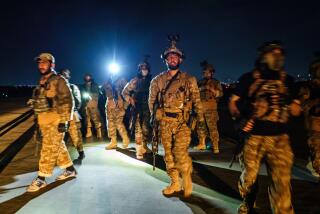Afghan city of Kunduz mostly quiet, residents venturing out
KABUL, Afghanistan — Criticism grew that the Afghan government ignored warnings that Taliban insurgents were threatening to overrun the city of Kunduz last week, with one top official acknowledging the failures Monday and the former local governor saying he had repeatedly appealed to Kabul to beef up security.
A semblance of order was returning to the city of Kunduz on Monday after a counter-offensive dislodged the three-day Taliban occupation in heavy fighting. Authorities raised the national flag over the governor’s office, shops began to reopen and residents ventured out into the streets, with the insurgents pushed to the city’s outskirts, battling with government forces.
But fallout continued from the debacle, which was an embarrassing blow to President Ashraf Ghani.
Afghan Chief Executive Abdullah Abdullah, chairing a council of ministers broadcast on live television, said the government had been warned “many times” that Kunduz might come under attack but “no one listened.”
“The reality is that there were shortfalls in what has been done there, what is going on in Kunduz right now, meaning that we haven’t done our job well,” Abdullah said. “But we are committed to assessing the situation. We should provide clear answers to the people of Kunduz.”
That was echoed by Mohammad Omer Safi, the Kunduz governor who was sacked by Ghani on Sept. 30, two days after the Taliban overran the city.
Speaking to The Associated Press, Safi said he had warned the Kabul government that the Taliban had held control of 60 percent of the province, also called Kunduz, for at least three months and were massing outside the city. He said he had drawn up detailed proposals for protecting the city and sent them to the highest levels of the government. But he received no feedback.
“I made the central authorities aware of it,” he said. He said he sent his proposals to the National Security Council and the Independent Directorate of Local Governance, a powerful body in charge of appointing provincial governors and supporting governance at local and provincial levels.
The IDLG’s communications manager, Munera Yousofzada said that “whatever documents regarding security concerns in Kunduz that were received from Mr. Safi were passed along to the relevant authorities.” She gave no further details.
One IDLG official confirmed that Safi’s reports are currently being reviewed by the IDLG. A security plan was now being formulated for Kunduz “based on Safi’s proposals,” the official said, speaking on condition he not be identified as he wasn’t authorized to speak to the media.
Safi, who has a degree in security and risk management from Britain’s Warwick University, said that since last December the city had successfully repelled three Taliban attacks, including a major attempt to overrun it in April. Last month, he said, he wrote to the IDLG “suggesting there was a risk to Kunduz city” and laying out a plan for a “security belt” of 15 new bases around the city to protect it, costing about $250,000.
“I sent numerous emails, follow-up calls. But the government could not find this money to make this belt,” he said.
He said the city is also plagued by a powerful “mafia” involved in drug smuggling that operates in collusion with local politicians and police. Kunduz is an important city on the Tajikistan border, a hub for smuggling routes to and from Central Asian countries. He said during his 11 months in office, he burned 16 tons of drugs, and one of his bodyguards was killed in an assassination attempt on him.
“This is the heart of northern Afghanistan, so if nothing (is done to clear the province of insurgents and criminal gangs) the problem will infiltrate Takhar and Badakhshan, Baghlan and finally Balkh provinces, and up to the Central Asian states,” he said. “It is very dangerous.”
In Kunduz, a city of 300,000, people were returning to the streets. Gen. Dawlat Waziri, the Defense Ministry spokesman, said the national flag was raised over the provincial governor’s office and the acting governor, Hamidullah Danishi — appointed to replace Safi — had returned to work.
But the Taliban left destruction in their wake. Qayum Khan, a resident reached by telephone, described corpses on the streets but could not tell if they were civilians or insurgents. Grocer Sardar Wali said he felt it was “normal ... so I have opened my shop.”
Clashes were still underway between government forces and the Taliban on the city’s outskirts, according to Khosh Mohammad, a member of the Kunduz provincial council.
The medical charity Doctors Without Borders continued to press U.S. and Afghan officials for an independent investigation into the bombing early Saturday of its hospital in Kunduz, in which at least 22 people were killed.
The top commander of American and coalition forces in Afghanistan said Monday that Afghan forces who reported being under Taliban fire requested the U.S. airstrike, correcting an initial U.S. statement that the strike had been launched because U.S. forces were threatened.
The Afghan and U.S. governments have pledged a full investigation, which could take some days. President Barack Obama said he expected a full accounting of the circumstances surrounding the bombing, and that he would wait for those results before making a judgment.
___
Associated Press writers Rahm Faeiz and Humayoon Babur in Kabul, Afghanistan, Robert Burns in Washington and Lolita C. Baldor in Madrid contributed to this report.
Copyright 2015 The Associated Press. All rights reserved. This material may not be published, broadcast, rewritten or redistributed.
More to Read
Sign up for Essential California
The most important California stories and recommendations in your inbox every morning.
You may occasionally receive promotional content from the Los Angeles Times.










